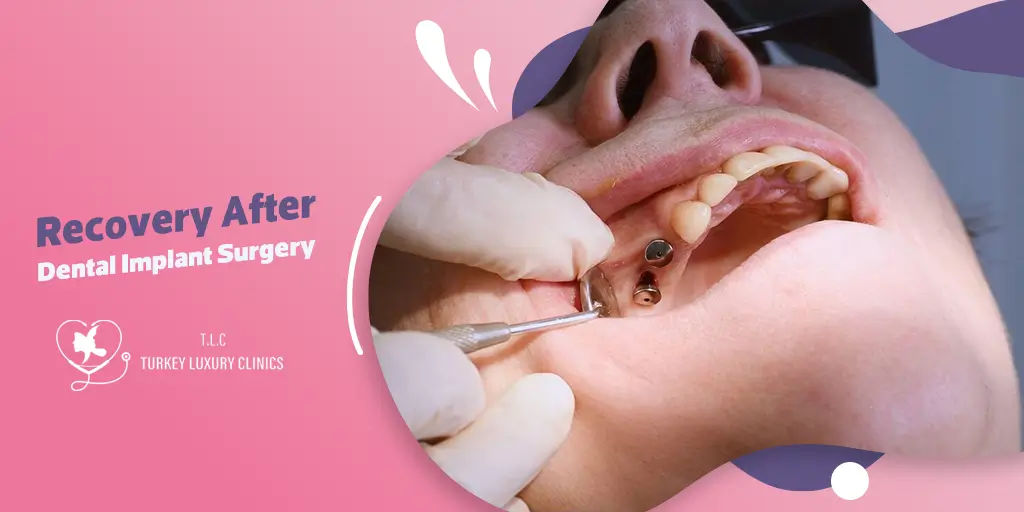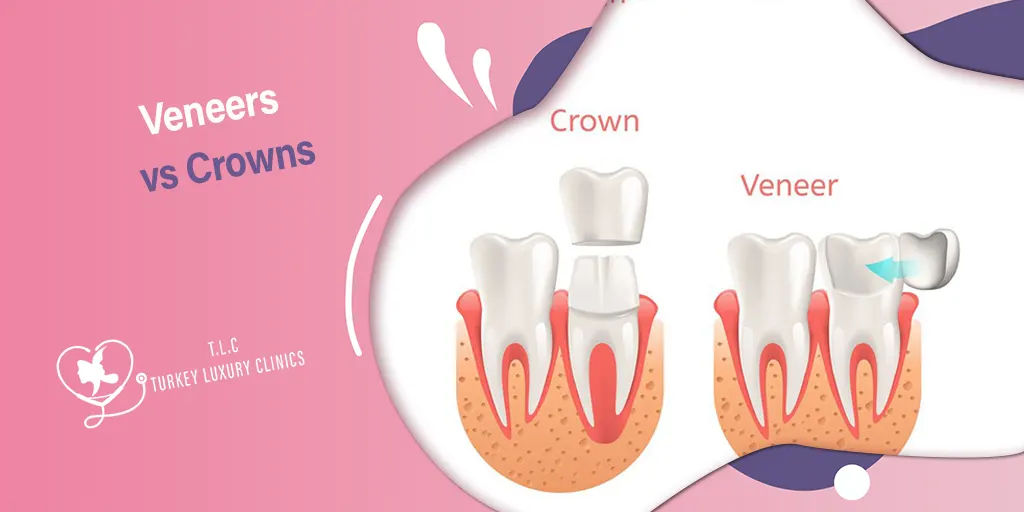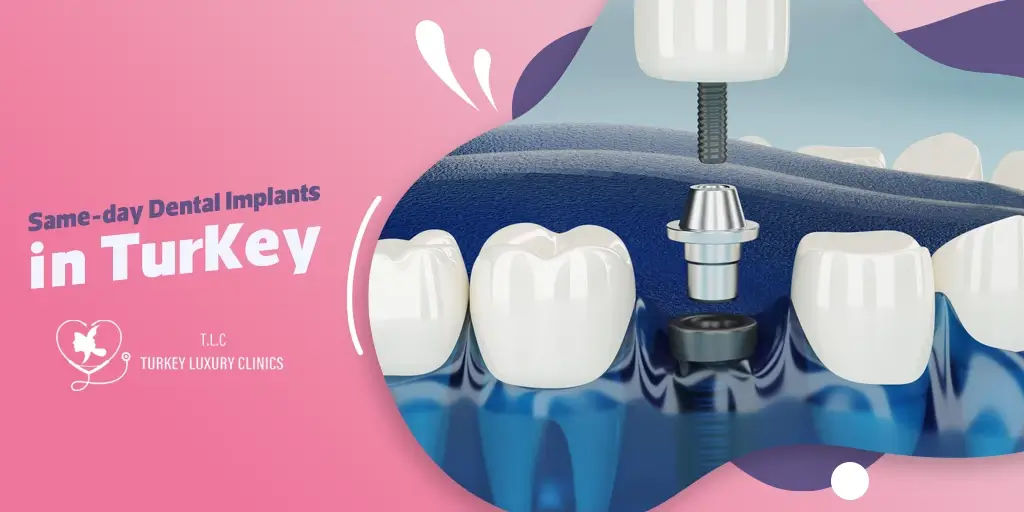- - Recovery Timeline: What to Expect
- - Tips for Smooth Healing
- - FAQs
- - Book Your Appointment at Turkey Luxury Clinics Today!
Dental implant surgery is a transformative procedure that can help patients regain a confident and fully functional smile. It is important for patients to understand the recovery process in order to ensure a smooth and successful outcome. In this guide, we will walk patients through the tips and timeline of recovering from dental implant surgery, ensuring they are well-prepared for every phase of the healing journey.
Recovery Timeline: What to Expect
Day 1-2: The initial phase.
The first two days following surgery are crucial for establishing a solid foundation for a smooth recovery. Please be aware that some swelling and discomfort may occur, which can be managed with the prescribed medications. It is important to adhere to a soft diet, maintain strict oral hygiene, and avoid strenuous activities during this period.
Day 3-7: Navigating the First Week
As the first week progresses, you can expect to see a reduction in swelling. Continue to adhere to a soft diet, take your prescribed medications, and schedule follow-up appointments with your oral surgeon as recommended. It is important to be gentle with your oral care routine and to avoid direct contact with the implant site.
Week 2-4: Healing Takes Center Stage
During the second, third, and fourth weeks, your attention should be directed towards allowing the implant site to heal. Gradually reintroduce more solid foods, but avoid anything too hard, crunchy, or abrasive. Please adhere to the oral hygiene instructions and any lifestyle modifications recommended by your oral surgeon.
Month 1-3: Implant Integration
The initial three-month period marks a pivotal point. This is a really important time for your implant to start integrating with your jawbone, which is called osseointegration. Your oral surgeon will probably want to schedule some check-ups to make sure everything is going well. It's also really important to keep up with your oral hygiene and gradually reintroduce your regular diet.
Months 3-6: Progress and Adjustments
Please be aware that, following your procedure, the third to sixth months will be a period of continued healing, during which adjustments may be made as required. Your oral surgeon may suggest modifications to your oral care routine or adjustments to the replacement teeth. It is crucial to schedule regular check-ups during this phase to ensure that everything is progressing as planned.
Beyond Six Months: Finalizing the Process
Once six months is up, most people are fully recovered and their dental implants have been successfully integrated. Your oral surgeon may suggest you have a check-up every so often, but you can generally resume your normal oral hygiene routine and diet.
Tips for Smooth Healing
Take prescribed medications: your oral surgeon will probably prescribe medications to manage pain and reduce inflammation, and to help prevent infection. It's important to follow the dosage and schedule exactly as prescribed. If you experience any unexpected side effects, please let your oral surgeon know right away.
Apply Cold Compresses: the application of a cold compress can assist in the reduction of post-operative swelling. To achieve this, an ice pack should be wrapped in a thin cloth and applied to the outside of your cheek near the surgical site for a period of 10-15 minutes at a time. This should be done, particularly during the first 24-48 hours following surgery.
Keep up your oral hygiene: Keep up with a thorough oral hygiene routine, but be gentle around the implant site. You can use a soft-bristled toothbrush, and you should follow any instructions your oral surgeon gives you. Just be gentle and avoid putting any pressure on the implant, as this can disrupt the healing process.
Nutritional considerations: for the first few days, stick to a soft-food diet and gradually reintroduce firmer foods as advised. Avoid extremely hot or cold foods, and stay hydrated. As you're on the road to recovery, you can gradually start eating more solid foods. It's important to avoid extremely hot or cold items and to stay hydrated to promote overall healing.
Get Some rest and refrain from strenuous exercise: It's important to give your body time to heal by getting enough rest. It's best to avoid any strenuous physical activities, especially in the initial days after surgery. Rest is really important for a speedy recovery and helps to reduce the risk of complications.
Keep your follow-up appointments: Your regular follow-up appointments with your oral surgeon are important. They help your surgeon keep an eye on your progress. These appointments are a chance for the surgeon to see how you’re healing, address any concerns you may have, and make any adjustments that might be needed. Make sure you attend all of your scheduled check-ups so that you can get the best possible outcome.
FAQs
- What is the typical duration of the recovery process following dental implant surgery?
The recovery period typically extends over several months, with the initial phase of healing lasting approximately 1 to 2 weeks and the full integration of the implant occurring over a period of 3 to 6 months.
- What food can I eat after dental implant surgery?
At first, stick to soft foods like soups, yogurt, and mashed potatoes. As your oral surgeon suggests, gradually reintroduce firmer foods.
- Is it normal to feel pain after dental implant surgery?
It's totally normal to feel some discomfort and swelling in the first few days. Your oral surgeon will prescribe painkillers and antibiotics to keep you comfortable and reduce the risk of infection.
- Can I start brushing my teeth normally again right after the surgery?
While it's important to take care of your teeth, be gentle around the implant site. Use a soft-bristled toothbrush and follow any instructions your oral surgeon gives you.
Book Your Appointment at Turkey Luxury Clinics Today!
It is of great importance to understand how recovery occurs following dental implant surgery. By adhering to your dentist's recommendations, you can help ensure the long-term success of your dental implants. If you have any questions or concerns about living with dental implants, please don't hesitate to contact us.














.webp)
.webp)
.webp)
.webp)

